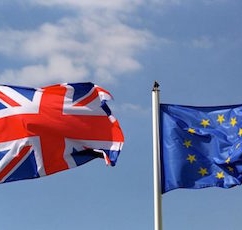Articles and News
Editorial: Brexit A Hiccup, Not A Heimlich, For Luxury Jewelry Industry | June 29, 2016 (0 comments)

Merrick, NY—Last week’s vote by Britons to leave the European Union (EU) sent global financial markets into a tizzy, with the effects likely to reverberate for weeks, if not months.
But both economic and jewelry industry pundits believe the impact of Brexit on the U.S. economy in general and the jewelry industry in particular should be relatively minimal. It was a hiccup, but nobody’s going to choke.
Gold jumped as soon as the “leave” vote was announced, hitting $1,320 an ounce on Friday and $1324 on Monday, its highest price since July 2014. While the jump is entirely fear-based trading, an article in MarketWatch explains how the potential is very real for gold to climb over $1,500 by year’s end and over $1,900 next year, though if it happens it would be due to global currency fluctuations, not Brexit specifically.
A statement from Rapaport Group chairman Martin Rapaport on Friday said Brexit will not have a sustainable negative impact on long-term diamond demand, and the U.S. market in particular should not be severely impacted. A strong dollar will be an advantage for American retailers. But further up the supply chain, the continued liquidity and credit squeeze by banks in the diamond sector may intensify. Overall, worry about driving demand among Millennials, not Brexit, he says.
Only two major U.S. jewelers are directly in the path of Brexit fallout: Signet, the U.K.-based parent of Sterling has significant presence in its home country (11.3% of revenues and 8.7% of profits last year); and Tiffany, which derives 40% of its European sales from the United Kingdom.
Despite Fed chair Janet Yellen’s warning about potential economic fallout in the United States, most economists are fairly sanguine. For example, Jay Bryson, global economist for Wells Fargo, says even globally, Brexit’s impact should be relatively minimal, as the United Kingdom accounts for only 4% of the global GDP. Likewise, he says direct financial effects on the U.S. economy also should be limited, as American bank exposure to British entities represents only 3% of total U.S. bank assets. Britain accounted for less than 4% of U.S. exports last year, or 0.4% of U.S. GDP. The U.S. economy also grew more than expected in the first quarter of 2016.
Bryson also has stated in the past that a huge chunk of U.S. consumer spending goes to education and health care, two categories that are as close to immune as possible to geopolitical drama. “If Russia invades Ukraine, are you not going to send your kids to college?” he asked at the time.
The Bull And Bear Financial Report concurs: Brexit will not spawn a recession in the United States. Nor will it spawn a global recession, as both China and the United States are fairly strong, if slow-growing, economies. Growth here may slow slightly further—driven more by a psychological lack of confidence than any real financial reason—but recession is unlikely. Investors may blanch at their portfolio right now, but Anne Kates Smith of The Kiplinger Report emphasizes not to make snap decisions about it. The stock market could be in for a bumpy ride over the next few months, but the long-term trend remains a bull market. If history is any indication, stocks will recover any Brexit-induced losses in a fairly brief period—as they did following both Black Monday in 1987, the Internet bubble burst in 2001 and yes, even the 2008 crisis—so this could be an excellent time to buy and in fact investors could very likely come out ahead in the long term.
In the immediate term, however, the question on most jewelers’ minds is, “how will this impact my sales for the rest of this year?” While none of us have a crystal ball, let’s look at a few things we already know:
- While holiday 2015 results were mixed, the majority of luxury jewelers had a good year overall.
- There is a noticeable trend toward consumers spreading their spending more evenly throughout the year, with Q4 holidays becoming less of a make-or-break period.
- $2,000 gold—if it were to happen—has its upsides as well as its challenges. A lot of jewelers benefited from street buying and melting down stale inventory the last time gold skyrocketed.
- The biggest impact on consumers right now is psychological: both people and stock markets hate uncertainty. On a global scale, Brexit has triggered a lot of uncertainty, both for the British economy and for the future of the EU, as other disillusioned nations may try to follow suit. Domestically, a fractious election year has everyone on edge and consumers are likely to remain wary until things are more settled.
- Long-term, growing income inequality is going to be an increasingly important issue for luxury retailers, far more than the vagaries of trade borders. Income inequality actually drives growth in the luxury market—until it tips too far and spurs a backlash against the wealthy and even the upper middle class. According to this year’s Wealth Report by property consultancy Knight Frank, almost two-thirds of ultra-high net worth consumers say they’ve become more conscious about publicly displaying wealth than they were a decade ago. This doesn’t spell the end of luxury shopping but it will mean a shift toward far more subtle, understated design that only a fellow UHNW individual would recognize as costly.
In the meantime, work the phones, work your email and handwritten invitations, work your events, amp up cause-related marketing, and give your best customers reasons to keep coming back, while showing up-and-coming consumers that fine jewelry is an experience worth having, not just a piece of stuff.
Top image: The Union Jack and EU flags won't be flying together in the future. Photo: telegraph.co.uk







